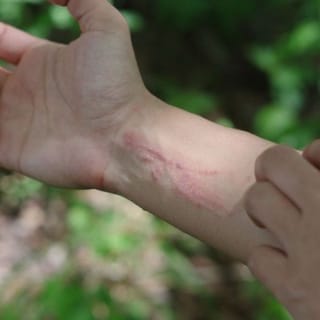 OVERVIEW
OVERVIEW
Contact dermatitis is an inflammatory skin condition that is caused when the skin comes into contact with a substance that acts as an irritant or allergen. Contact dermatitis can be classified as a type of eczema.
What are the Causes of Contact Dermatitis?
There are two main causes of contact dermatitis:
- Irritant Contact Dermatitis
Irritant contact dermatitis is the most commonly occurring type of contact dermatitis. According to the National Eczema Association, approximately 80% of all contact dermatitis cases are due to irritant dermatitis. People with irritant contact dermatitis do not experience an allergic reaction. Instead, they develop a rash after coming into repeated contact with an irritant such as a cleanser, soap, or even detergent.
- Allergic Contact Dermatitis
Allergic contact dermatitis occurs when your skin comes into contact with an allergen. As a result, the body develops an allergic reaction to the substance resulting in an itchy rash. The allergic reaction generally does not occur with the initial exposure. It is the subsequent exposures that result in an allergic reaction.
Common allergens include:
- Plants such as poison ivy
- Metals such as nickel
- Medications such as antibiotic ointments
- Personal care products such as sunscreens, wet wipes, or hair dyes
- Airborne substances such as ragweed pollen and insecticides
What are the Symptoms of Contact Dermatitis?
Common symptoms of contact dermatitis include:
- Itching, which can be severe
- Burning, stinging, or pain
- Rash which can be red, scaly, flaky, or bumpy
- Swelling, blistering, oozing or crusting
What is the Treatment for Contact Dermatitis?
A dermatologist can accurately diagnose your condition and recommend a treatment regimen that works for you.
At your visit, your provider will examine your skin and may ask you a series of questions related to your health, skin care practices, job, hobbies, and activities. Your provider may suggest or discuss pursuing patch testing: a process where multiple small patches containing different ingredients are applied to the patient’s back in an attempt to determine what substances are causing an allergic reaction.
The most common treatments options for contact dermatitis include:
- Avoiding irritants and allergens. Your provider will help you try to identify and avoid any substances which may be irritating your skin or causing an allergic reaction. Oftentimes, dermatologists may recommend methods to protect your skin and avoid further contact with the irritant or allergen such as wearing gloves to do household chores.
- Establishing a gentle skin care routine. Your provider may recommend using only mild, fragrance-free cleansers and applying a good emollient such as a moisturizing cream on a regular basis.
- Medications: Topical steroids are often used to treat contact dermatitis. For the most severe, widespread cases, your provider may consider oral steroids.

 OVERVIEW
OVERVIEW



